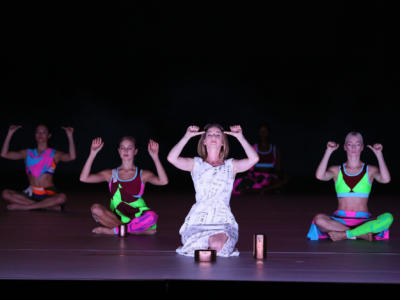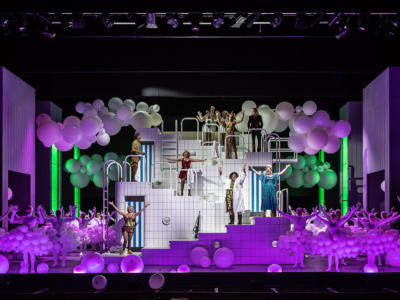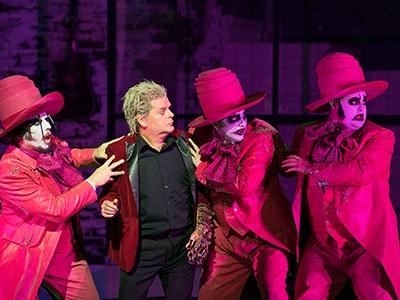ENO Response 19/20: Carmen Opera reviews
31st January 2020 in News
ENO Response is a new scheme that gives aspiring journalists and reviewers the opportunity to produce opera reviews and receive writing advice and feedback.
ENO has had no editorial input in the reviews. All views are their own.
Patrick Shorrock

Carmen by Bizet is about as Spanish as the Champs Elysées. Or at least that was Noel Coward’s take on the opera and its incorrigible Frenchness. So there was a certain logic in getting Spanish bad boy director Calixto Bieito to have his way with Carmen. Predictably enough, he brutally banishes every trace of tourist espangnolerie, but, more surprisingly perhaps, the only things that seem typically Spanish in this scenically bare setting are a vandalised phone box, a flagpole flying the Spanish flag, and a huge metal bull dominating the act 3 set that is dismantled before act 4’s bullfight. Lillas Pastia’s bar is a car and a few crates of beer with a lit Christmas tree – why?- on an otherwise bare stage. Act 3’s dawn over the mountains is transferred to a lay-by with lots of cars. This is a brutal world where toxic masculinity lurks barely concealed beneath the brutal military discipline, and the women are either trying to ward off predatory male advances or encourage them for the sake of economic survival. Frasquita – or is it Mercedes? – has a young daughter whom she takes everywhere (Franco’s dictatorship during the 70s where this production is set clearly didn’t believe in making childcare available!). Even Carmen, rather than revelling in her own brand of rebellious seductiveness, is ground down and exhausted by the sheer struggle to make her way in this hostile, capitalist, patriarchal world. Jose lashes out with his fists at Carmen even before the Flower Song, which was shocking and meant that their relationship was going downhill before it even started.
A programme note helpfully explains some of the details of the production whose meaning would otherwise be obscure, whilst not managing to justify all of the gratuitous business (including a man taking his clothes off before having a dance during the act 3 prelude). Bieito’s production – faithfully revived by Jamie Manton – provides a warning to any gay man of the terrible dangers of rampant heterosexuality. Yes, I know the woman usually has to die in 19th Century opera, but she generally manages to enjoy herself rather more whilst alive than she does here.
Oddly none of this prevents the audience from having a good time. The production, for all its minor annoyances, has plenty of wit and theatrical effectiveness and is performed with tremendous energy. The final confrontation between Jose and Carmen is set as a bullfight in a circle of sand from which Carmen cannot escape. Not that she has much to live for as she is already bored with being Escamilio’s trophy girlfriend, tottering on her high heels and determined to win the argument, as she’s never won anything else in her life. Usually, I’m left wondering why she doesn’t just kick pathetic little psycho Jose in the balls and leg it, but here it made sense.
Bizet’s music, conducted by Valentina Peleggi, remains as enjoyable as ever for the audience – as much in the small incidental details as the very familiar big tunes. There are some very fine performances. Justina Gringytè’s Carmen has plenty of stage presence and admirable diction; that is all the more impressive as she is a Lithuanian singing in English. She is perhaps at her best in Acts 3 and 4, where her vocal weight and dark colour were particularly appropriate. She more than delivers the goods before then, although I’ve seen and heard more playful and seductive Carmens. But part of Bieito’s point is that she isn’t putting on a performance for our benefit – or providing an enjoyable critique of masculine weakness until it all goes wrong, but is fighting for her own survival. Sean Panikkar’s Jose was dramatically a little tentative to start with, but vocally excellent: he has elegant phrasing and a gorgeously secure high pianissimo, as well as sounding thrilling at full throttle in the final confrontation. What a joy it was not to hear this part belted. There is perhaps more passion to be found in the part, but then he is essentially a not very nice middle-class boy, out of his depth, amongst gangsters rather than a romantic hero. Nardus Williams has an appealing stage presence and is an unusually assertive Michaela, who even spits at Carmen, although some lovely phrases were spoilt by others that were a bit shrill and thin. Ashley Riches’ Escamillio was more successful than many in this part, but there is reason why Bizet directed his toreador song to be delivered avec fatuité.
There is something rather shocking about depicting Carmen, who is so evidently her own woman, as a victim, but when you remember that she is killed by her lover, this is an entirely valid way to see her. I’ve seen more enjoyable productions, but this one leaves you with plenty to think about.
Tacita Quinn

Calixto Bieito’s Carmen storms the stage of the London Coliseum for a rancorous revival of his original production. Depicting opera’s favourite toxic relationship between Carmen and the soldier Don José, this production offers a powerful exploration of desperation under undesirable circumstances. The entrapment of both characters in what they fundamentally are, a downwardly spiralling soldier and a licentious but impoverished woman, is what ultimately leads to their grisly end. Justina Gringyté’s Carmen is an interesting interpretation of the role, she is not so much the rebellious force of nature of Bizet’s original intention, but rather a woman who thoroughly understands male desires and the grim hand she has been dealt in life. The story turns from a narrative of the threat posed by seductive women, to one that warns of the dangers of sustained exposure to violence, and the mentality this instils in Don José. Sean Panikkar’s depiction of Don José picks up on this detail, the dichotomy between his controlled façade and his bubbling uncontrollable rage is key to his remarkable performance. However, despite impressive performances from the main cast and the chorus, this production was not as coherent in its staging it possibly could have been. The set, originally designed by Alfons Flores, though at times displaying some very thought-provoking visual imagery, often felt a little too sparse, and the costumes, designed by Mercè Paloma, were lacking in symbolic significance. Nonetheless, ENO’s first production this season is a stimulating piece, full of the drama of a classic interpretation of Carmen, but with a deeper, more sinister message about the insidious nature of human violence.
The production opens with soldiers parading in the square, a sparse set, a single man running in a circle around them in his underwear, evidently as punishment. The arrival of the timid but capable Micaëla, played by Nardus Williams, sends the soldiers into a desperate plea for her attention, but she tells them she is looking for José, a man she clearly loves. Williams’s performance is strikingly different to other interpretations of this role, because her interest in José is very obvious, and it is less a choice for José than a contest between Micaëla and Carmen. The tense and disturbing atmosphere at the beginning of the show is sustained throughout, with Alex Otterburn’s portrayal of Moralès being an effective representation of the violent, cruel and disgusting behaviour that surrounds the corrupt army.
Initially, Carmen’s presence on stage was a little underwhelming, even during the famous ‘Habanera’ aria, but this picked up substantially in the Third Act. As the tension between Carmen and José grew, so did the chemistry between Panikkar and Gringyté. Overall, the performances were more impressive when the chorus was present, because of the expansive staging. In Bieito’s vision, this spacious staging is meant to represent the sparse poverty-stricken streets that have been exposed to the presence of the military. Although in some instances this works, especially in the clever changes of scenery between acts, it can also feel as if the performers are spending too much time trying to fill the space rather than cultivate deep chemistry.
The costumes, although evidently aiming to express a sense of the community of the downtrodden that is being represented in this opera, were lacking in originality and significance beyond their most obvious symbolic representation. However, the military uniforms, in tandem with the fabulous lighting design by Bruno Poet, created some highly imposing silhouettes and sustained the aggressive atmosphere. One of the highlights of the production was when José confronts the bullfighter Escamillo, who is also in love with Carmen. The knife fight jumps across the stage, making use of the levels created by the tops of the contraband cars, their enlarged silhouettes on the back of the stage intensifying the drama.
Needless to say, the music for Carmen is extraordinary, the conductor, Valentina Peleggi, carries the orchestra beautifully, and the translation, if occasionally not as romantic as the French, deftly interweaves with the score. Overall, this production is well worth seeing, it is invigorating and thought provoking, although lacking in certain production elements. It navigates the complicated zone between social violence and domestic abuse, while also linking it to a wider question of how brutality becomes normalised, and in particular brutality towards women and children. With its very clear social message, this production of Carmen can be at times hard to watch, but ultimately it is a necessary adaption that invites us to reflect on the glorified violence of other productions.
Daniel Shailer

The curtains of the Coliseum go up on a bleak and dusty parade ground. Bizet’s sequins and Spanish flourishes have been abruptly replaced with sand and bootcamp discipline: less Iberian sunshine, more Full Metal Jacket. Calixto Bieito realises Carmen in Franco’s 1970s military regime; it doesn’t feel like too radical a reinterpretation, amplifying ideas that are already present in the opera about sex, passion and how individuals fit amongst (and between) the barriers society erects around them. If that doesn’t sound like a riotous flamenco of fun, that’s because it’s not. But it’s enjoyable and Bieito introduces a welcome level of ironic distance from Bizet’s more overfamiliar moments.
Moments of seduction are never far from violence: Sean Panikkar serenades Justina Gringyte’s Carmen after he has bloodied her nose, and she returns the favour as two pimps urinate on Morales’ unconscious body upstage. Bizet’s music is given the full extent of its expressive power, even as Bieito plays with our expectation of the opera and problematises the action onstage. In this manner, the prelude to Act 3 (Bizet’s beautiful, if somewhat trite bucolic miniature) sets the scene for a disconcerting image: the very calmest of streakers. To pastoral flutes, a soldier presents a wonderfully baffling mating dance, his thigh-slapping entertainment cut short by the arrival of Carmen and Jose. This is Bizet’s opera with a clear direction – masculinities and their many performances.
In a production without any bullfighting, men and women take up the mantle in turns. The motif of whipping recurs throughout the performance: a punishment reserved for prisoners, traitors and (of course) women. But it’s the men who charge about the stage horned and, eventually, cuckolded by Carmen. In a brilliant example of how this production refreshes Carmen’s imagery, the only bull onstage is an enormous metal cut-out, looming over the third act. Bieito dispenses with a rather tired critical vein: yes, the bull is a symbol. He seems to suggest that it doesn’t matter what it’s a symbol of, so much as that this symbol – like so many social strictures – can be mobilised to serve a masculine agenda. Women’s bodies are commodified, but when Carmen uses hers to buy freedom, Don Jose’s toys are out the pram and it’s time for revenge. A crew (what is the collective noun for burly shirtless men?) of soldiers arrive after the third Act to topple and literally dismantle this towering symbol.
Yes, these are male spaces – for men, by men. Carmen sends Don Jose back to his army ‘playground’ where toxic masculinity wears the uniform of authority. The chorus of female factory workers array their legs along the stage front, like a dangling catalogue for the soldiers. Like Virginia Woolf looking up at a London’s testaments to male architecture, Alfons Flores’ set designs are all flag poles and wrestling wrings. We would do well to mull on these masculine spaces under the Coliseum’s ‘landmark tower’ and, indeed, squeezing past the inevitable women’s queue in the interval on the way to the gents. It seems fitting that Ashley Riches’ Escamillo isn’t particularly dashing or buff, appearing closer to home instead, suited and booted in the grey two-piece and tie of an office lads’ night out.
Panikkar gives one of the most developed performances of the season so far as Don Jose, vocally, but even more so dramatically and his deterioration is convincingly framed with a progression of costume changes. He is only outdone by Justina Grintgyte’s snarling smile and force of life in the titular performance. In a production that takes the time to present Carmen’s themes and adapt them to Bieito’s vision so cogently, it is these moments of powerfully genuine storytelling that return the opera to its emotional heft. Grintgyte and Panikkar are joined by an energetic supporting cast, of whom ENO Harewood Artist, Nardus Williams is a clear highlight. If they occasionally stumble over a slightly gnarly English libretto, it is to their credit that the flow is not overly impeded.
Coherent and entertaining, Calixto Bieito’s production of Carmen brings enough novelty to opera’s most well-known story. It delivers on the promise of any classic adaptation: the hits are all there and Valentina Peleggi leads the orchestra through them with sparkling vivacity. These moments are interpreted in a world of toxic masculinity and necessarily so; to give a familiar set of characters new impetus. But for all the thought-provoking presentation of gender and performativity, it is ironically the powerful performances of genuine emotion that shines through, bringing this production home for any audience, old or new.




